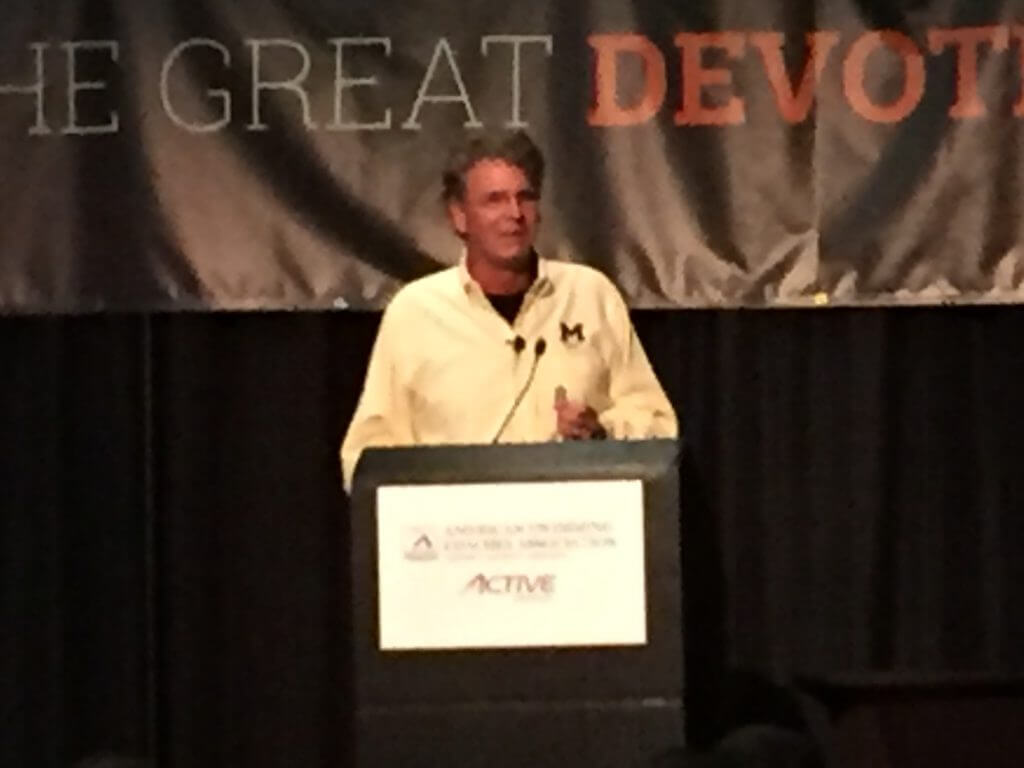Mike Bottom Lives Out His Olympic Dream Deferred

By David Rieder.
Mike Bottom has dreamed all his life of qualifying for the Olympics. In 1980, that dream was deferred.
Bottom earned a spot on the squad that would have been bound for the Moscow Games, but the U.S. boycotted those Olympics following the Soviet Union’s invasion of Afghanistan. And Bottom had to sacrifice that dream.
He was no stranger to giving up dreams for the right cause. After all, his father had given up his own career in the Navy because the lifestyle of living on a submarine for months at a time was too much for his family. So when Bottom was forced to do the same for his country, he understood.
“When we went to the White House and got to shake hands with Jimmy Carter, there were some people who were really bitter. They didn’t want to shake his hand,” Bottom said Thursday at the ASCA conference in Ft. Lauderdale. “But I can guarantee you when you have an opportunity to expand the dream and get to look in the eyes of a man like Jimmy Carter, it was a privilege.”
Bottom’s own swimming career was over, but that experience helped inspire what would be the next chapter for him in the sport.
“My new dream was to put as many people on the Olympic teams as had been denied their dream in 1980,” Bottom said.
That would mean getting more than 50 athletes to the Games as a coach. And so began Bottom’s long coaching career, which would take him to Phoenix, Cal-Berkeley, the Florida Keys with the Race Club—one of the first dedicated postgrad training groups—and now Michigan.
Bottom’s breakthrough in coaching came when he delivered two colorful but talented sprinters to the top of the Olympic podium in 2000.
He was coaching 25-year-old Gary Hall Jr., who four years removed from challenging Alexander Popov in Atlanta but coming up just short in both the 50 and 100 free. The brash Hall was never afraid to share his predictions—like how the Americans would smash Australia like guitars in the 400 free relay—but had yet to ever win an individual Olympic gold.
And then there was 19-year-old Anthony Ervin, who had vaulted on the scene and would swim next to his training partner in the biggest race of his career.
“Coaching those two guys was a continual entertainment,” Bottom said. It was really like watching an older dog and a puppy, a puppy nipping at the heels of the older dog.”
Ervin and Hall tied for the gold in the 50 free in Sydney, and Hall added a second gold medal in the event four years later in Athens, defeating Croatia’s Duje Draganja—another Bottom product—by one one-hundredth of a second.
Only one teenager qualified for the U.S. team headed to Beijing in 2008, and it was Nathan Adrian, who had taken the year off from Cal to train in Florida with Bottom—and ended up finishing fourth in the 100 free at Olympic Trials.
Bottom’s legacy was secure as one of the all-time great sprint coaches, but he wanted more. And in 2008, he accepted an offer to become the head coach at the University of Michigan, a program with a massive legacy of cranking out distance swimmers.
So Bottom hired Josh White as his lead assistant.
“I brought in a guy I knew could help me understand distance training,” Bottom said.
The decision paid off as Bottom and White coached Michigan to an NCAA championship in 2013 with a distance swimmer leading the way. That was Connor Jaeger, who had just swum in his first Olympic Games and was on the path to becoming the undisputed top distance swimmer in the country.
This June, Jaeger qualified for his second Olympic team, coming from behind to win the men’s 400 free on the first night of Olympic Trials. Bottom waited as Jaeger walked through his post-race media commitments, and when they finally met at the far end of the mixed zone, the two men hugged as they broke down in tears.
With open water swimmer Sean Ryan already on the team, it suddenly occurred to Bottom that maybe he could get White onto the Olympic coaching staff. But when he approached White about the idea, he balked.
“Mike, it’s not my dream,” White said. “It’s your dream. I’ve been working hard to make that happen.”
After all of the athletes Bottom had placed onto Olympic teams over the years, the time had come to seek his own spot—again. This time, without any boycotts.
Bottom spoke with U.S. National Team director Frank Busch and with head men’s Olympic team coach Bob Bowman to state his case for being on the team—one which also included Ervin, who Bottom no longer coached but remained close with.
“Sometimes, no matter how humble you are, you have to talk about yourself,” Bottom said. “And that’s also for the people who have supported you all these years.”
And so hours before the last night of Olympic Trials—when Jaeger would go for (and eventually earn) a spot on the team in a second event, the 1500 free—Busch announced the Olympic team coaching staff in a press conference, and that list included, for the first time, the emotional man in the back of the room, Mike Bottom.
When Bottom found out, he immediately Nort Thornton, the man who had been his head coach during their time at Cal, and the two men got choked up on the phone.
“And then I called my wife—should have called her first,” Bottom said. “I called Anthony. I called Connor. Thanked them both.”
Even two months later, recalling the moment made Bottom pause as his eyes watered.
Bottom described his road to Rio as “crooked,” but a straight path, he figured, would not have been so satisfying.



